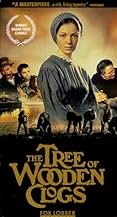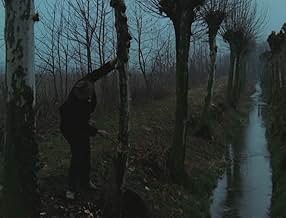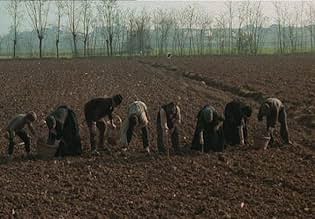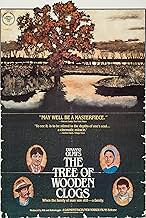Füge eine Handlung in deiner Sprache hinzuPeasant life in a feudal farm in rural Italy at the end of the 19th century.Peasant life in a feudal farm in rural Italy at the end of the 19th century.Peasant life in a feudal farm in rural Italy at the end of the 19th century.
- 1 BAFTA Award gewonnen
- 18 Gewinne & 1 Nominierung insgesamt
Empfohlene Bewertungen
I can think of several films that have had that effect on me. Eric Rohmer's "Summer (Le Rayon Vert)" and Kieslowski's "Decalogue" spring to mind. But "Tree of Wooden Clogs" approached the core. I'm not Catholic, would pronounce myself an atheist if that didn't suggest the arrogance of certainty, but this movie comes as close to touching the soul as any I've ever seen. It is one of the most shattering, delightful, and profound works of art ever created. After first seeing it, I sat in my car, clutched the steering wheel, and sobbed for half an hour.
Since that day, many years ago, moments from it continue to haunt me. I'll be walking down a street lined with trees and remember the boy walking home from school. Out of the blue, the looks on the faces of the just-married young couple as they adopt a child will come to me. And, of course, the image of the villagers watching the lone wagon disappear into the darkness is one which will live with me until I die.
In short, as I stumble my own way through life, this film is one of the touchstones that reminds me why I'm here.
It was like if someone would've been reading me a poem whilst watching such beautiful landscapes. And all through that, you feel in your own skin the love for their own soil. it seems as if they had been rooted to the grounds.
Certainly it is not for everyone's tastes but it is truly a moving experience.
Axel.
The most authentic version on this film has the original Bergamasco dialect track. The newer DVDs from Italy have the option of choosing this soundtrack.
This film is sort of a more modern Neo-realist sort of film because like the Neo-realist films of the 1940s and early 1950s, it is an Italian film that consists of non-professional actors in natural settings. However, the reason why this was done is quite different. During the time of WWII and post-war Italy, sets and actors were hard to come by and directors (such as De Sica and Rossellini) had no choice but to make these sorts of films. However, in 1978 the film was made this way for entirely different reasons--to heighten the sense of realism as the film was about simple folks and having professionals playing these roles might have detracted from this realism.
The film is set on a farming collective owned by a landlord. Five families work the land and share a large compound broken down into separate apartments and stables. The life is pretty simple and rather grim and the film does a very good job of portraying this life. And this is much of the problem with this film for the average viewer. While history teachers like me might find it all pretty fascinating and like how accurately this is all portrayed, will the average viewer? Probably not. That's because not all that actually happens in the film---and it lasts about three hours. As a result, the film does drag and I even found myself feeling sleepy as I watched. It's exceptionally well crafted but also a bit of a chore to view.
"Tree of Wooden Clogs" is a film that film critics will adore but the average person will probably hate...and many folks will feel guilty because they didn't 'get' the movie and think they should have.
Wusstest du schon
- WissenswertesAll the actors were real peasants from the Bergamo province, in Italy. They had no acting experience at all.
- PatzerWhen the children are making music with pots and pans, the 'instruments' of the little girl are switching from one hand to the other when the camera looks at her from the other side.
- Zitate
[first lines]
Don Carlo: That boy should be going to school.
Batistì: Yes but six kilometers to school and six kilometers back seems a lot.
Don Carlo: He's young, he has strong legs.
Batistì: Just when we're about to have another baby. He could have started helping me around the house.
Don Carlo: He'll help you even more when he's older. Let providence provide for now.
Batistì: I grew up without ever seeing the inside of a school.
Don Carlo: That's not a good reason, and you know it. If God has given your boy a good mind, it's a sign he's expecting more of him. As the boy's father, it's your duty to do God's bidding.
- Crazy CreditsQuite strangely, the names of the actors are listed as "last name first name", while the names of the rest of the crew are correctly listed as "first name last name".
- Alternative VersionenThere are two versions of this movie: one which is spoken in the dialect of Bergamo, Italy, and one in which the actors dubbed themselves in Italian.
- VerbindungenEdited into Bellissimo: Immagini del cinema italiano (1985)
- SoundtracksIch steh' mit einem Fuß im Grabe BWV, 156
Composed by Johann Sebastian Bach
Performed by Fernando Germani
Top-Auswahl
- How long is The Tree of Wooden Clogs?Powered by Alexa
Details
- Erscheinungsdatum
- Herkunftsland
- Sprache
- Auch bekannt als
- The Tree of Wooden Clogs
- Drehorte
- Produktionsfirmen
- Weitere beteiligte Unternehmen bei IMDbPro anzeigen
Box Office
- Weltweiter Bruttoertrag
- 9.367 $
- Laufzeit
- 3 Std. 6 Min.(186 min)
- Sound-Mix
- Seitenverhältnis
- 1.33 : 1





















